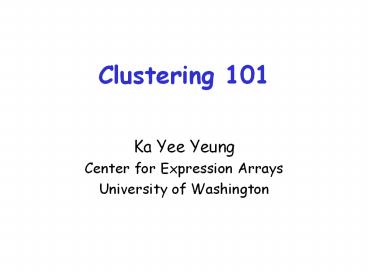Clustering 101 PowerPoint PPT Presentation
1 / 31
Title: Clustering 101
1
Clustering 101
- Ka Yee Yeung
- Center for Expression Arrays
- University of Washington
2
Overview
- What is clustering?
- Similarity/distance metrics
- Hierarchical clustering algorithms
- Made popular by Stanford, ie. Eisen et al. 1998
- K-means
- Made popular by many groups, eg. Tavazoie et al.
1999 - Self-organizing map (SOM)
- Made popular by Whitehead, ie. Tamayo et al.
1999
3
What is clustering?
- Group similar objects together
- Objects in the same cluster (group) are more
similar to each other than objects in different
clusters - Data exploratory tool
4
How to define similarity?
Experiments
genes
X
n
1
p
1
X
genes
genes
Y
Y
n
n
Raw matrix
Similarity matrix
- Similarity metric
- A measure of pairwise similarity or
dissimilarity - Examples
- Correlation coefficient
- Euclidean distance
5
Similarity metrics
- Euclidean distance
- Correlation coefficient
6
Example
Correlation (X,Y) 1 Distance (X,Y)
4 Correlation (X,Z) -1 Distance (X,Z)
2.83 Correlation (X,W) 1 Distance (X,W)
1.41
7
Lessons from the example
- Correlation direction only
- Euclidean distance magnitude direction
- Min attributes (experiments) to compute
pairwise similarity - gt 2 attributes for Euclidean distance
- gt 3 attributes for correlation
- Array data is noisy ? need many experiments to
robustly estimate pairwise similarity
8
Clustering algorithms
- Inputs
- Raw data matrix or similarity matrix
- Number of clusters or some other parameters
- Many different classifications of clustering
algorithms - Hierarchical vs partitional
- Heuristic-based vs model-based
- Soft vs hard
9
Hierarchical Clustering Hartigan 1975
- Agglomerative (bottom-up)
- Algorithm
- Initialize each item a cluster
- Iterate
- select two most similar clusters
- merge them
- Halt when required number of clusters is reached
dendrogram
10
Hierarchical Single Link
- cluster similarity similarity of two most
similar members
- Potentially long and skinny clusters Fast
11
Example single link
5
4
3
2
1
12
Example single link
5
4
3
2
1
13
Example single link
5
4
3
2
1
14
Hierarchical Complete Link
- cluster similarity similarity of two least
similar members
tight clusters - slow
15
Example complete link
5
4
3
2
1
16
Example complete link
5
4
3
2
1
17
Example complete link
5
4
3
2
1
18
Hierarchical Average Link
- cluster similarity average similarity of all
pairs
tight clusters - slow
19
Example average link
5
4
3
2
1
20
Example average link
5
4
3
2
1
21
Example average link
5
4
3
2
1
22
Hierarchical divisive clustering algorithms
- Top down
- Start with all the objects in one cluster
- Successively split into smaller clusters
- Tend to be less efficient than agglomerative
- Resolver implemented a deterministic annealing
approach from Alon et al. 1999
23
Partitional K-MeansMacQueen 1965
2
1
3
24
Details of k-means
- Iterate until converge
- Assign each data point to the closest centroid
- Compute new centroid
Objective function Minimize
25
Properties of k-means
- Fast
- Proved to converge to local optimum
- In practice, converge quickly
- Tend to produce spherical, equal-sized clusters
- Related to the model-based approach
26
Self-organizing maps (SOM) Kohonen 1995
- Basic idea
- map high dimensional data onto a 2D grid of nodes
- Neighboring nodes are more similar than points
far away
27
SOM
- Grid (geometry of nodes)
- Input vectors that are close to each other mapped
to the same or neighboring nodes
28
Properties of SOM
- Partial structure
- Easy visualization
- Tons of parameters to tune
- Sensitive to parameters
29
Summary
- Definition of clustering
- Pairwise similarity
- Correlation
- Euclidean distance
- Clustering algorithms
- Hierarchical (single-link, complete-link,
average-link) - K-means
- SOM
- Different clustering algorithms ? different
clusters
30
Which clustering algorithm should I use?
- Good question
- No definite answer on-going research
- If you cant sleep at night, feel free to read my
thesis - http//staff.washington.edu/research
31
General Suggestions
- Avoid single-link
- Try
- K-means
- Average-link/ complete-link
- If you are interested in capturing patterns of
expression, use correlation instead of Euclidean
distance - Visualization of data
- Eisen-gram
- Dendrogram
- PCA, MDS etc

